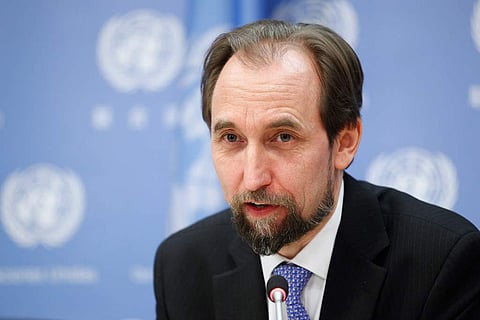

COLOMBO: Prince Zeid Ra'ad Al Hussein, UN High Commissioner for Human Rights, told the UN Human Rights Council (UNHRC) in Geneva on Wednesday, that Sri Lanka must appoint foreign judges to thejudicial mechanism it is to set up to try war crimes cases. But the Sri Lankan Representative, Deputy Foreign Minister Dr.Harsha de Silva, avoided using the term “foreign judges” in his reply, and instead said that Sri Lanka will take “foreign expertise and assistance.”
Calling for foreign judges as per the resolution co-sponsored by Sri Lanka in September-October 2015, Prince Zeid said that “the consistent failure to effectively investigate, prosecute and punish serious
crimes appears to reflect a broader reluctance or fear to take action against members of the security forces.”
“Combined with a general lack of trust in the impartiality of the justice system regarding past violations, this continuing unwillingness or inability to address impunity reinforces the need for international participation in a judicial mechanism. For this to be credible, it should include a special counsel, foreign judges and defense lawyers, and authorized prosecutors and investigators.”
In his reply, the Sri Lankan representative Dr. de Silva said: “ As we go through the complex process of establishing new mechanisms, we will continue to consult with all segments of our society. We will also
seek international expertise and assistance, as all countries do, when they undertake such responsibilities.”
Dr.de Silva’s rejection for foreign judges is in line with the policy of Sri Lankan President Maithripala Sirisena and Prime Minister Ranil Wickremesinghe who have categorically ruled out the use of foreign
judges, except as observers and experts as it has done in the past.
The Prime Minister has said that Sri Lankan law does not provide for the use of foreign judges to give judgments. Sri Lanka has not accepted the jurisdiction of the International Criminal Court either.
The minority Tamils, who consider themselves to be the victims of the war, want foreign judges because they fear that the majority Sinhalese will be biased against them and will not take action against the
predominantly Sinhalese armed forces. On the other hand, the majority Sinhalese fear that foreign judges will be biased against the Sinhalese dominated armed forces and will also not consider the
Sinhalese to be victims of Tamil terrorism.
The question of foreign judges is proving to be divisive as it makes the Tamils band together against the Sinhalese, and the Sinhalese to band together against the Tamils. Many activists in the reconciliation
movement fear that the foreign judges issue will hamper and not promote ethnic reconciliation.
Pleading Sri Lanka’s case and asking for patience and tolerance, Dr. de Silva said: “This Council knows that no country’s human rights record is perfect. It is always work-in-progress. The people of Sri Lanka
have been through extremely difficult and painful times, and although much has been done, there is much still left to do, including strengthening our institutions and achieving economic progress. There
are multiple challenges that we face.”
“But, as a responsible and committed Government, under the leadership of President Sirisena and Prime Minister Wickremesinghe, we are determined to stay the course. We will listen to all, we will study
all reports carefully, we will exchange information, share our concerns and comments, engage constructively and meaningfully with our partners, and take the necessary steps required to ensure that Sri Lanka is a nation that is prosperous, united in its diversity, upholding human rights, justice, and the rule of law.”
Dr.de Silva said that Sri Lanka expects the council to give two years’ time to implement the 2015 resolution, and said that it will co-sponsor this year’s resolution too.
Fortunately for Sri Lanka, Prime Zeid took an accommodative stance even as he doubted the impartiality of the Sri Lankan judicial system.
“I note promising progress regarding constitutional reform, with the Parliament establishing itself as a constitutional assembly. Inclusive public consultations conducted by the Public Representations Committee were followed in November by reports from six subcommittees appointed by the Constitutional Assembly to make recommendations regarding fundamental rights, the judiciary, finance, law and order, public service and centre-periphery relations.”
“Although progress to establish transitional justice mechanisms has been slow, I am heartened by the recent report of the Consultation Task Force on Reconciliation Mechanisms, synthesizing thousands of
submissions from across all ethnic and religious groups,” he said.
However, Zeid stressed that the need of the hour is “agreement on a comprehensive strategy, with a time-line and detailed benchmarks,” to address all the transitional justice pillars identified in Resolution
30/1 (September 2015) resolution co-sponsored by Sri Lanka.
Further, in the face of rising frustration among victims, a number of confidence-building measures must be accelerated, he added.
“These include the release of land occupied by the military, which remains slow. While an effort is underway to repeal the Prevention of Terrorism Act and replace it with legislation that complies with
international human rights law, this work has yet to be concluded. Numerous pending cases under the Prevention of Terrorism Act have not yet been resolved.”
“The design of truth and reparations processes appear to be underway, but these efforts need to be in consultation with the victims and civil society. It is important for the country’s future to send the
signal that impunity is no longer tolerated. I am particularly troubled by the lack of progress in a number of emblematic cases,” Zeid said.
Finally, the High Commissioner urged Sri Lanka’s Government to regularly consult the independent commissions, and particularly the Human Rights Commission, which have an invaluable role in
strengthening good governance.
“I encourage respect for their mandate and autonomy, adequate financing, and implementation of their recommendations,” he added